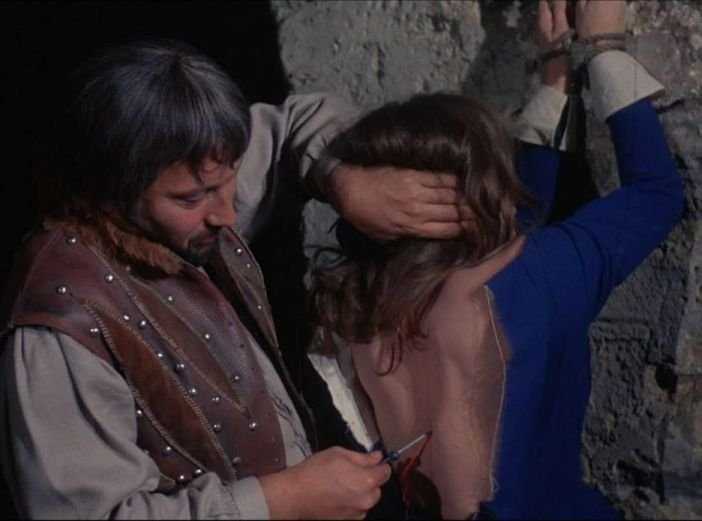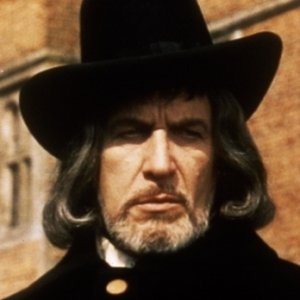THE WITCHFINDER GENERAL: Inhumanity, Cinema's Scariest Monster
Throughout the '50s and much of the '60s, English horror mostly stuck to an old-fashioned, distinctly gothic flavor of horror established by Hammer Films. There was the occasional splash of blood or a heaving bosom to add a dose of shock value but it was essentially fantasy-driven material that was easy to keep at arm's length, psychologically speaking.
 However, things changed at the end of the '60s as young directors embraced the freedom of the times to take a more daring approach to the genre. Michael Reeves was one of those directors - and before his career was tragically cut short, he made an amazing film entitled The Witchfinder General. Though it was set in olden times and featured old-school horror icon Vincent Price, it offered a distinctly modern portrayal of corruption and violence that gives it true shock power.
However, things changed at the end of the '60s as young directors embraced the freedom of the times to take a more daring approach to the genre. Michael Reeves was one of those directors - and before his career was tragically cut short, he made an amazing film entitled The Witchfinder General. Though it was set in olden times and featured old-school horror icon Vincent Price, it offered a distinctly modern portrayal of corruption and violence that gives it true shock power.
The plot was inspired by real people and events from English history, with the focus being Matthew Hopkins (Price). During the Cromwell era in England, he travels the countryside with his assistant Stearne (Robert Russell) and collects money from villages for "testing" and almost always executing those accused of being witches. Of course, the victims are all innocent mi sfits but Hopkins takes perverse joy in killing.
sfits but Hopkins takes perverse joy in killing.
He also takes advantage of young women desperate to protect those they love - and that's how he runs afoul of young soldier Richard (Ian Ogilvy). After Hopkins uses his role as inquisitor to rape Richard's fiancée Sara (Hilary Dwyer) and murder her uncle, John (Rupert Davies), Richard vows to take bloody revenge. Unfortunately, his mission is complicated by the war affecting his part of England - and Hopkins proves to be a foe who is as resourceful as he is diabolical.
On the surface, The Witchfinder General has the basic structure and feel of a vintage British adventure or suspense film: the plotting is pace conscious, with a lot of chases and punch-ups between the moments of horrific content. It also has handsome production values designed to compete with the elegance of the Hammer Films style. The photography by future Straw Dogs cinematographer John Coquillon gives the countryside exteriors a lush look and the Paul Ferris sc ore alternates gorgeous orchestrations with rousing action music.
ore alternates gorgeous orchestrations with rousing action music.
However, these comforting elements are a velvet glove that harbors an iron fist. Reeves' script, co-written with Tom Baker uses the character of Hopkins to show how mob mentality and unfounded fear can lead to tragedy - and also be exploited by the unscrupulous, who destroy the innocent and leave the survivors corrupted by their wicked deeds.
Reeves' direction drives this point home, portraying the violence in a grim fashion that communicates the kind of pain and suffering that was uncommon in many films from 1968. Since its release, many films have portrayed such events in a more explicit fashion - but the cool, unflinching  portrayal of brutality in The Witchfinder General still retains the power to unnerve because it is done in a focused, skillful way that captures the emotional and psychological impact of these acts.
portrayal of brutality in The Witchfinder General still retains the power to unnerve because it is done in a focused, skillful way that captures the emotional and psychological impact of these acts.
The film's impact is heightened by strong performances. Though Price is the star, Ogilvy is the one who has to do the dramatic heavy lifting here: he is quite impressive as he shows his character shifting from the brave, carefree man at the beginning of the film to an angry, haunted soul who becomes consumed with revenge. His final moments in the film are truly shattering. Dwyer and Davies add solid support and Russell is memorably nasty as a gleeful torturer.
 That said, Price earns his star billing here with one of his most unique performances: he strips back any hint of camp or over-the-top theatrics to create a character who is terrifying because he is icy and controlled at all times. It's the subtlest of his horror film performances and chillingly effective in the setting Reeves creates for it.
That said, Price earns his star billing here with one of his most unique performances: he strips back any hint of camp or over-the-top theatrics to create a character who is terrifying because he is icy and controlled at all times. It's the subtlest of his horror film performances and chillingly effective in the setting Reeves creates for it.
In short, The Witchfinder General remains bracing stuff even by modern standards because it delves into the dark side of human nature in an incisive, disarmingly calm way that allows the viewer to grasp the full awfulness of what they are witnessing. The result doesn't need any monsters to qualify as a horror film because it proves that humans are scarier than any creature of the night. As such, it is an important film and something any fan of English horror should see.


